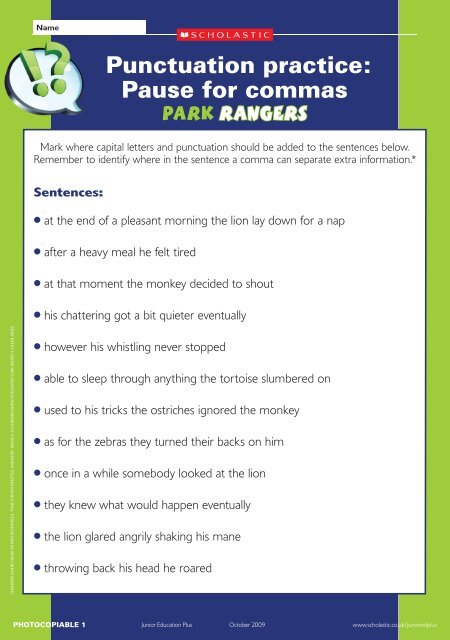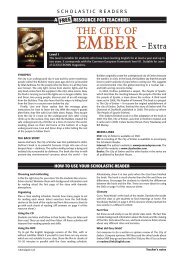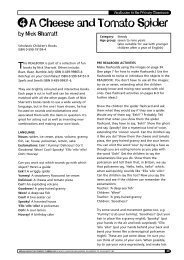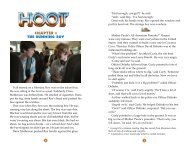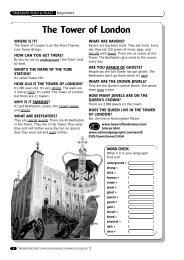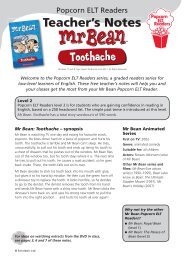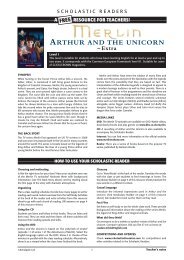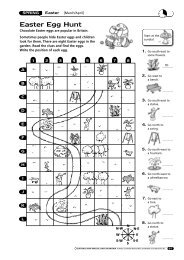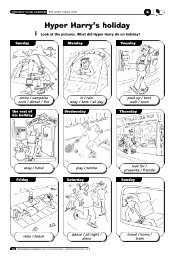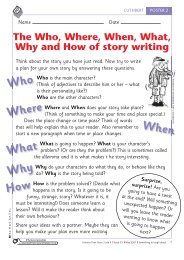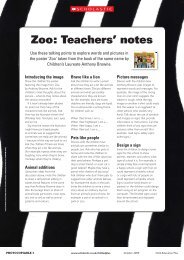Punctuation practice: Pause for commas - Scholastic
Punctuation practice: Pause for commas - Scholastic
Punctuation practice: Pause for commas - Scholastic
You also want an ePaper? Increase the reach of your titles
YUMPU automatically turns print PDFs into web optimized ePapers that Google loves.
Name<strong>Punctuation</strong> <strong>practice</strong>:<strong>Pause</strong> <strong>for</strong> <strong>commas</strong>Park RANGERSMark where capital letters and punctuation should be added to the sentences below.Remember to identify where in the sentence a comma can separate extra in<strong>for</strong>mation.*Sentences:• at the end of a pleasant morning the lion lay down <strong>for</strong> a nap• after a heavy meal he felt tired• at that moment the monkey decided to shout• his chattering got a bit quieter eventually*ANSWERS CAN BE FOUND ON PHOTOCOPIABLE 8, ‘PUNCTUATION PRACTICE: ANSWERS’; IMAGE © JULIENGRON/WWW.STOCKXPERT.COM; WORDS © EILEEN JONES• however his whistling never stopped• able to sleep through anything the tortoise slumbered on• used to his tricks the ostriches ignored the monkey• as <strong>for</strong> the zebras they turned their backs on him• once in a while somebody looked at the lion• they knew what would happen eventually• the lion glared angrily shaking his mane• throwing back his head he roaredPHOTOCOPIABLE 1Junior Education Plus October 2009 www.scholastic.co.uk/junioredplus
Name<strong>Punctuation</strong> <strong>practice</strong>:<strong>Pause</strong> <strong>for</strong> <strong>commas</strong>Park keepersUse something from each column to make eight different sentences.Always begin with a subordinate (less important) clause and rememberto include a capital letter and full stop.*CLAUSE CLAUSE CONJUNCTION COMMAyou start feeding theanimalsthe animals needextra wateralthough ,take greater responsibility<strong>for</strong> animal welfarean accident could occur because ,*ANSWERS CAN BE FOUND ON PHOTOCOPIABLE 8, ‘PUNCTUATION PRACTICE: ANSWERS’; IMAGE © JULIENGRON/WWW.STOCKXPERT.COM; WORDS © EILEEN JONESrecord results on aspreadsheetyou want to improveyour skillsyou finish giving out foodget to know all the animalshave somebody to assistyou move the pythons in case ,you are head keeper whenever ,you must weighmeal portionsyou want to judge theanimals’ progressyou may have specialfavouritesafter ,be<strong>for</strong>e ,as ,use equipment carefully attend new courses if ,PHOTOCOPIABLE 2Junior Education Plus October 2009 www.scholastic.co.uk/junioredplus
Name<strong>Punctuation</strong> <strong>practice</strong>:<strong>Punctuation</strong> choiceRead the text below then punctuate it considering how your choice ofmarks will set the mood. Compare your ideas with a partner. Did youchoose the same punctuation? Remember, there is not always a correctmark; a writer can choose, so your classmate might pick a different moodto express than you.What a fantastic place the safari park is Why haven’t you been tovisit There are mischievous monkeys giant giraffes and crawlingcrocodiles As <strong>for</strong> other animals the list is endless lions elephantspeacocks pythons and so many more There is something to watchall the time a monkey swinging from a climbing frame a peacockcatching food a lion climbing a ladder If you are interested in food aWhat a fantastic place thesafari park is Why haven’tyou been to visit There aremischievous monkeys giantgiraffes and croaking crawlingcrocodiles As <strong>for</strong> otheranimals the list is endless lionselephants peacocks pythonsand so many more There isdelicious menu is available with indoor and outdoor eating Are youstill too busy to visit Surely not The park is open every day between8am and 8pm So book a date now The animals are expecting youPossible version (Other punctuation is possible.)IMAGE © JULIENGRON/WWW.STOCKXPERT.COM; WORDS © EILEEN JONESWhat a fantastic place the safari park is! Why haven’t you been to visit?There are mischievous monkeys, giant giraffes and crawling crocodiles.As <strong>for</strong> other animals, the list is endless: lions, elephants, peacocks,pythons and so many more. There is something to watch all the time:a monkey swinging from a climbing frame, a peacock catching food,a lion climbing a ladder. If you are interested in food, a delicious menuis available, with indoor and outdoor eating. Are you still too busy tovisit? Surely not! The park is open every day between 8am and 8pm.So book a date now. The animals are expecting you!PHOTOCOPIABLE 3Junior Education Plus October 2009 www.scholastic.co.uk/junioredplus
<strong>Punctuation</strong> <strong>practice</strong>:In parenthesesThe sentences below are taken from the Interactive resource,‘Animal punctuation: Descriptive texts’ and can be used with theactivity ‘In parenthesis’ in the ‘Further ideas’ section (pages 18–19,October ’09 issue).*• Our monkeys some born in the safari park are in tip-top health• The adults and the cubs still very small belong to one familygroup*ANSWERS CAN BE FOUND ON PHOTOCOPIABLE 8, ‘PUNCTUATION PRACTICE: ANSWERS’; IMAGE © JULIENGRON/WWW.STOCKXPERT.COM; WORDS © EILEEN JONES• Crocodiles and tortoises not usually kept together arehappy here• The trees sturdy and bushy give our elephants fun and food• Suki known <strong>for</strong> her big appetite is the tallest giraffe in Europe• These zebras admired <strong>for</strong> their stripes are our mostphotographed animals in the park• One ostrich the one ignoring you is very shy• Our deer who are perfectly safe have freedom to roam• The peacocks’ colours blue red and purple are magnificent• The pythons known to bite are kept behind safety glassPHOTOCOPIABLE 4Junior Education Plus October 2009 www.scholastic.co.uk/junioredplus
Name<strong>Punctuation</strong> <strong>practice</strong>:Sophisticated marksThe safari park keeper has written a memo to the Editor of the Safari Gazette. Hewants the news article to use some tricky punctuation marks. Read through theunpunctuated text and see if you can help out by placing the punctuation marksthat the safari park keeper wants to include.*MEMOFrom: KeeperTo: Editor*ANSWERS CAN BE FOUND ON PHOTOCOPIABLE 8, ‘PUNCTUATION PRACTICE: ANSWERS’; IMAGE © JULIENGRON/WWW.STOCKXPERT.COM; WORDS © EILEEN JONESPHOTOCOPIABLE 6Please publish the text below. As well as full stops and capitalletters, there must be:• : colon x3• , comma x1• ’ apostrophe x1• ; semi colon x3• ( ) pair of brackets x1• , , parenthetic <strong>commas</strong> x3• – dash x1• ! exclamation mark x1Unpunctuated text:the safari park is thriving everyone is really happy the weather isamazing we have sunny days and high temperatures the cafés icecream is really popular we are close to the middle of july july andaugust always bring more children children make ideal visitors theypay attention to the animals and they eat a lot our caring keeperhas had a wonderful idea he is teaching the monkeys new exercisesif he is successful there will be many benefits our customers thevisitors will gain pleasure the monkeys his pupils will have fun johnthe keeper may win an award however smallJunior Education Plus October 2009 www.scholastic.co.uk/junioredplus
<strong>Punctuation</strong> <strong>practice</strong>:Teachers’ notes:Descriptive textsUse this month’s activities to help your class use punctuation more fluently. Descriptive texts tend to be longerand there<strong>for</strong>e use more punctuation. This means more chance of error, so it is important to keep returning tothe basics and confirming accuracy. Nevertheless, there is also more opportunity <strong>for</strong> choice and the childrenwill enjoy exploring the subtle differences made by their selections.IMAGE © JULIENGRON/WWW.STOCKXPERT.COM; WORDS © EILEEN JONESDaily description1Discuss with the children how the animals, people or objects onthe Poster, ‘<strong>Punctuation</strong> Safari Park’ can look like punctuationmarks. Practise your class’ animal code: the agreed soundsor simple hand or body movements that remind them ofthose animals and marks. (See July 09’s Photocopiable 3,‘<strong>Punctuation</strong> <strong>practice</strong>: Teachers’ notes’.) Write and display adescription of the park – a short paragraph describing onesection – but deliberately omit punctuation. Read it aloud, askingthe children to use the animal code to tell you what punctuationmark to put where.<strong>Punctuation</strong> pitfall A2Using a comma instead of a full stop is a common mistake.Help children to avoid this punctuation pitfall by teaching thisdifference: a comma introduces another part of a sentence; a fullstop marks the end of one sentence. Put the children into pairs,one holding a card ‘p’ (phrase) the other holding an ‘s’ (sentence).Display an unpunctuated sentence or phrase: partners mustdecide who should hold up their letter. For example:• the lion is sleepy (s)• a car full of people (p)• under the tree next to the rock (p)• there are three elephants (s)• similar animals to tigers in appearance (p)• where is the missing tortoise (s)<strong>Punctuation</strong> pitfall B3Let the children practise their learning from the previous activityby placing <strong>commas</strong>, full stops and capital letters in the textbelow. Write it unpunctuated on the whiteboard:That picnic area looks so welcoming. By always being clean andtidy, it invites people to stop and enjoy their food. The area is sweptand raked regularly, rubbish taken away promptly. Sometimesreaching crumbs be<strong>for</strong>e the peacocks, the park attendant isdetermined that everywhere looks its best. Up the steps andinside the café, the visitors receive the same welcome. In fact, it’s awonder people have time to visit the animals at all!Encourage partners to read aloud, discuss and justifydecisions with each other.Taking dictation4Play ‘Taking dictation’ (see July 09’s Photocopiable 3,‘<strong>Punctuation</strong> <strong>practice</strong>: Teachers’ notes’.) in which partners,working separately, write a short descriptive text containingat least three <strong>commas</strong> and three full stops. In turn, theyshould dictate their text to their partner ‘secretary’ towrite it down. When they reach punctuation, they mustuse the animal code. (See ‘Daily description’, left.) Will theirsecretary remember the code and punctuate what theywrite correctly? Will their secretary agree with their choiceof punctuation?Clearing confusion5Read aloud the following three sentences taken fromthe unseen, corrected version on Photocopiable 3,‘<strong>Punctuation</strong> <strong>practice</strong>: <strong>Punctuation</strong> choice’:• There are mischievous monkeys, giant giraffes andcrawling crocodiles.• As <strong>for</strong> other animals, the list is endless: lions, elephants,peacocks, pythons and so many more.• There is something to watch all the time: a monkeyswinging from a climbing frame, a peacock catching food, alion climbing a ladder.Ask what the structure of the three sentences has incommon? (All contain a list.) What punctuation mark dothe children expect to separate the items? Display thesentences <strong>for</strong> the children to confirm the use of <strong>commas</strong>.Ask: Which list is quite complicated? Why? (Details of theactions of the listed animals are described in the thirdsentence.) What alternative punctuation mark is there?(Semi colon) Explain that a semi colon is sometimes usedinstead of a comma in a complicated list; some writersprefer its clearer division. Display:There is something to watch all the time: a monkey swingingfrom a climbing frame; a peacock catching food; a lionclimbing a ladder.PHOTOCOPIABLE 7Junior Education Plus October 2009 www.scholastic.co.uk/junioredplus


